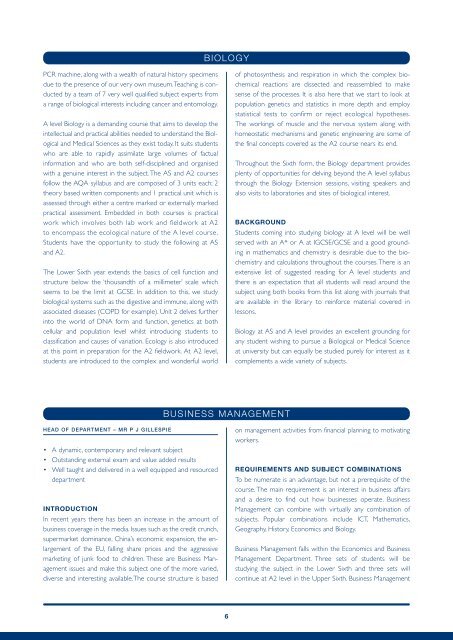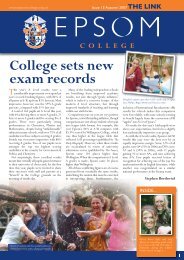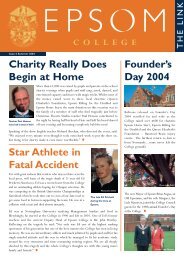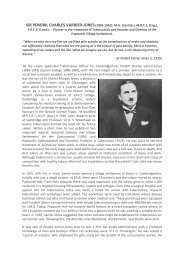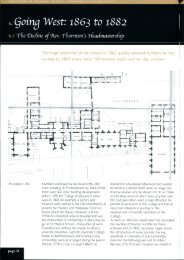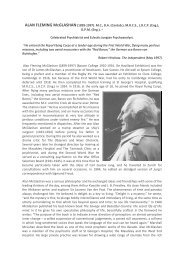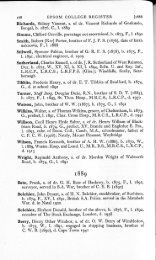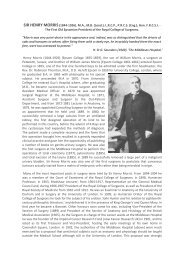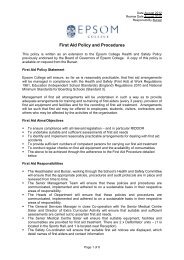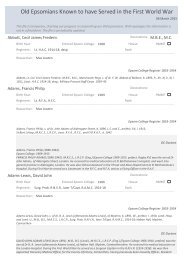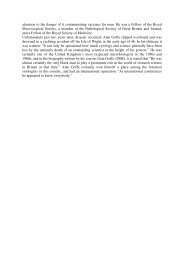Sixth Form Information Booklet 2014 - Epsom College
Sixth Form Information Booklet 2014 - Epsom College
Sixth Form Information Booklet 2014 - Epsom College
- No tags were found...
You also want an ePaper? Increase the reach of your titles
YUMPU automatically turns print PDFs into web optimized ePapers that Google loves.
BIOLOGYPCR machine, along with a wealth of natural history specimensdue to the presence of our very own museum.Teaching is conductedby a team of 7 very well qualified subject experts froma range of biological interests including cancer and entomology.A level Biology is a demanding course that aims to develop theintellectual and practical abilities needed to understand the Biologicaland Medical Sciences as they exist today. It suits studentswho are able to rapidly assimilate large volumes of factualinformation and who are both self-disciplined and organisedwith a genuine interest in the subject.The AS and A2 coursesfollow the AQA syllabus and are composed of 3 units each; 2theory based written components and 1 practical unit which isassessed through either a centre marked or externally markedpractical assessment. Embedded in both courses is practicalwork which involves both lab work and fieldwork at A2to encompass the ecological nature of the A level course.Students have the opportunity to study the following at ASand A2.The Lower <strong>Sixth</strong> year extends the basics of cell function andstructure below the ‘thousandth of a millimeter’ scale whichseems to be the limit at GCSE. In addition to this, we studybiological systems such as the digestive and immune, along withassociated diseases (COPD for example). Unit 2 delves furtherinto the world of DNA form and function, genetics at bothcellular and population level whilst introducing students toclassification and causes of variation. Ecology is also introducedat this point in preparation for the A2 fieldwork. At A2 level,students are introduced to the complex and wonderful worldof photosynthesis and respiration in which the complex biochemicalreactions are dissected and reassembled to makesense of the processes. It is also here that we start to look atpopulation genetics and statistics in more depth and employstatistical tests to confirm or reject ecological hypotheses.The workings of muscle and the nervous system along withhomeostatic mechanisms and genetic engineering are some ofthe final concepts covered as the A2 course nears its end.Throughout the <strong>Sixth</strong> form, the Biology department providesplenty of opportunities for delving beyond the A level syllabusthrough the Biology Extension sessions, visiting speakers andalso visits to laboratories and sites of biological interest.BACKGROUNDStudents coming into studying biology at A level will be wellserved with an A* or A at IGCSE/GCSE and a good groundingin mathematics and chemistry is desirable due to the biochemistryand calculations throughout the courses.There is anextensive list of suggested reading for A level students andthere is an expectation that all students will read around thesubject using both books from this list along with journals thatare available in the library to reinforce material covered inlessons.Biology at AS and A level provides an excellent grounding forany student wishing to pursue a Biological or Medical Scienceat university but can equally be studied purely for interest as itcomplements a wide variety of subjects.BUSINESS MANAGEMENTHEAD OF DEPARTMENT – MR P J GILLESPIE• A dynamic, contemporary and relevant subject• Outstanding external exam and value added results• Well taught and delivered in a well equipped and resourceddepartmentINTRODUCTIONIn recent years there has been an increase in the amount ofbusiness coverage in the media. Issues such as the credit crunch,supermarket dominance, China’s economic expansion, the enlargementof the EU, falling share prices and the aggressivemarketing of junk food to children. These are Business Managementissues and make this subject one of the more varied,diverse and interesting available.The course structure is basedon management activities from financial planning to motivatingworkers.REQUIREMENTS AND SUBJECT COMBINATIONSTo be numerate is an advantage, but not a prerequisite of thecourse. The main requirement is an interest in business affairsand a desire to find out how businesses operate. BusinessManagement can combine with virtually any combination ofsubjects. Popular combinations include ICT, Mathematics,Geography, History, Economics and Biology.Business Management falls within the Economics and BusinessManagement Department. Three sets of students will bestudying the subject in the Lower <strong>Sixth</strong> and three sets willcontinue at A2 level in the Upper <strong>Sixth</strong>. Business Management6


